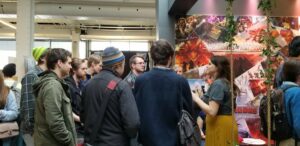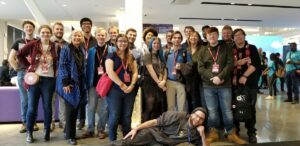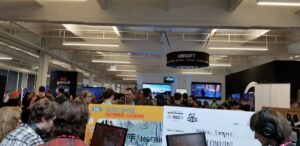I’ve never been to a conference before. Sure, I’ve been to career fairs and Comicons, but never have I ever been to a large conference revolving around game developers, their games, and companies. This led to a whole new event that I wasn’t ready for but, pushed me into having one of the best experiences I’ve had while starting in the game industry.
Montréal Expo Gaming Arcade (MEGA) is more of a family event for all ages, while Montréal International Game Summit (MIGS) is a developers’ conference specifically, meant for networking and celebration of game development. While some may not see the importance of MEGA, only wanting to expand their LinkedIn network or talk to developers of AAA studios, there’s a lot to be said about the MEGA experience. There’s a section dedicated to physical board games in MEGA that’s taken down for the conferences in MIGS that I think a lot of mechanics in video games can be driven by. Not only that, but there’s a whole community of game development being somewhat ignored at MIGS that’s prevalent at MEGA; Creative and niche physical game development through electronic means. As an example, during MEGA there’s a corner where you play PONG, but instead of an arcade machine or computer, you use see-saws to move the cursor up and down, creating a physical art piece that adds game development and physical movement to a very simple mechanic. This all is not to say that MIGS conferences aren’t important, but there should be space for experiences like this at a game developers conference.

My experience with the conferences was limited, but my time spent was well enjoyed. A unique discussion from many people from a variety of companies that are connected to every important aspect of game development. Social media and outlook, programming software, organization, updating live games, different perspectives from AAA developers to the smallest Indie producer, and everything in between. While you could find many of these developers or representatives on the floor, the conferences were where you could get a bulk of information that is directly involved with something you’re interested in whether or not it’s directed towards their game or company.

I’m a current Game Production Management Major, meaning part of my future is dedicated to networking. Knowing a lot of people isn’t just helpful in creating a large contact list, it helps create the potential for a job, which for a business major is very important. We don’t have many hard skills; While artists have portfolios and programmers have examples of their work, producers have business papers and SWOT analysis- nothing unaverage from every other business major, making us exclusively more difficult to find a job without a lot to show off besides our experience. This is why a contact list is important. Meeting new people, creating a good first impression, and keeping that relationship strong, whether, through Facebook, email or LinkedIn is part of our futures. MEGA/MIGS is then a cauldron of opportunity for us, compared to the public events like Comicon where developers aren’t concerned with who they meet but how much they sell. Here, in Montreal, there’s made an opportunity for newer game developers to make connections unlike any other. And I took advantage of that.
Another aspect of MEGA/MIGS that I get sold on was the number of games you’re able to see. While I was there, I saw several games I would never have heard of otherwise. Cool puzzle games, simulators, VR, party games, slower more story-based games, are all there. A lot of them have their unique twist; Documentaries on space, but in 360 degrees VR, a VR game you have to yell to move faster in the game, a twin-stick game with two players each controlling half the character. The limitations are varied depending on the console, but many studios can show more unique content here rather than they would at bigger, more public events. You’re also a lot more likely to get to talk to the developers themselves, learning about the history of the game and what lead to the product it is today. It gives a new perspective on indie as well as bigger titles hearing the honest feelings from not just a representative, but the programmers, artists, and designers that worked on the game.
Finally, while networking and seeing many cool games creates a cool environment, it’s the overall experience and atmosphere that makes MEGA and MIGS so memorable and unique. The culmination of all the people you meet, the loud noises of laughter and cheer, the long lines that give anticipation to another unique experience. It all pulls together into a worthwhile event for any game development enthusiast.


